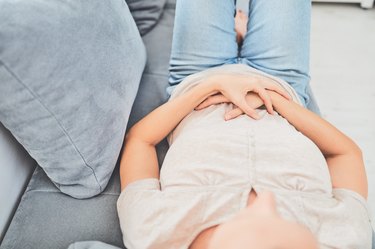
You're making all the changes necessary to lose weight, from overhauling your diet to ramping up your exercise program. You're starting to feel better in many ways except one, and you start to wonder why your new lifestyle seems to be making you constipated.
What Is Constipation?
Video of the Day
"Constipation is officially defined as fewer than three spontaneous bowel movements (BMs) per week that are difficult to pass," says Aaron Cohn, MD, a gastroenterologist with Northwestern Medicine in Lake Forest, Illinois. "There is no 'normal' number, as long as you are comfortable. Some people have multiple BMs per day, while others have a single BM once every three to four or even five days." Even if you are having bowel movements, difficulty passing stools can be a symptom of constipation.
Video of the Day
What Causes Constipation?
There are many reasons why people get constipated. "It can be due to impaired motility of the colon — the colon is not a passive tunnel but a dynamic organ that propels waste," says Dr. Cohn. Or it could be "anatomic abnormalities — some people have severely 'twisty' or 'tortuous' colons — [or] obstruction, colon cancer or an inflammatory stricture, or problems with the act of defecation, what I call difficulty with evacuation," he says.
However, it could also be caused by lifestyle choices, like lack of movement, being dehydrated or taking certain medications, according to the Mayo Clinic.
What Causes Constipation When Dieting?
Constipation can result from a combination of many things. "There are many overlapping factors, including diet, exercise, GI motility and even mood," says Dr. Cohn. "And the microbiome, otherwise known as the bacterial ecosystem in your gut, is intertwined with all of the above. If you're trying to lose weight, all of these things are likely to be altered and cause at least a temporary change in your baseline bowel habits."
How you've changed your diet in an attempt to lose weight could also be a factor. If your new eating plan has less fiber because you're cutting out good-for-you but high-carb whole grains, has more protein or involves fasting, your regularity could be impacted.
How Can You Avoid Constipation?
Try these steps to help your body adjust to your new diet and help you avoid or conquer your constipation:
- Get active, eat real food and stay hydrated. "I recommend doing aerobic activity every day," says Dr. Cohn. When you go food shopping, stick to the perimeter of the store where fresh foods are sold. And be sure to drink enough fluids, especially water, throughout the day — urine should be a pale yellow color or clear, he explains.
- Increase fiber intake. Be sure to include high-fiber foods in your diet. These include beans, cruciferous vegetables, whole fruits and whole grains, according to the Mayo Clinic.
- Allow yourself time to sit on the toilet. "This should be done ideally at the same time every day. Get comfortable and relax," says Dr. Cohn. "Some of my patients like using stools by the toilet like the Squatty Potty to elevate the legs." Also, go as soon as possible after you feel the urge to defecate. Don't wait.
- Try a fiber supplement. Even with a healthy active lifestyle and a well-rounded diet, some people develop constipation. A common type of laxative is a fiber supplement, like psyllium, that can be mixed into, or taken with, water or juice. The extra fiber causes bulkier and softer stools that are easier to pass.
- Consider taking a laxative. There are also other types of laxatives that work in different ways to stimulate BMs or make your stools easier to pass. "The colon naturally reabsorbs water back into the body, causing stools to become more hard," says Dr. Cohn. "Hydrate the colon with a scoop of MiraLAX (polyethylene glycol 3350) in 6 to 8 ounces of water or juice. Although the name sounds like a scary chemical, it is actually an inert water-soluble compound that passively draws water into the colon and holds it in the stool, softening it and increasing the frequency of BMs."
But keep this in mind: Lifestyle changes are the best way to prevent or manage constipation. If you start depending on the use of a laxative to relieve constipation, talk to your doctor.
Read more: Struggling to Poop? Here are 5 Foods That Cause Constipation (and 6 That Keep Things Moving)
A Word of Concern
Constipation doesn't cause weight loss. If you're concerned that your weight loss is more than it should be from your new eating plan — the Centers for Disease Control and Prevention suggests one to two pounds a week — check in with your doctor.
"If you are having weight loss and constipation, you should see a doctor to rule out a serious condition," says Dr. Cohn. "From a gastroenterologist's perspective, colon cancer is the number-one diagnosis to rule out. Other possibilities include the development of an inflammatory bowel disease or mechanical obstruction from another cause."
Is this an emergency? If you are experiencing serious medical symptoms, please see the National Library of Medicine’s list of signs you need emergency medical attention or call 911.